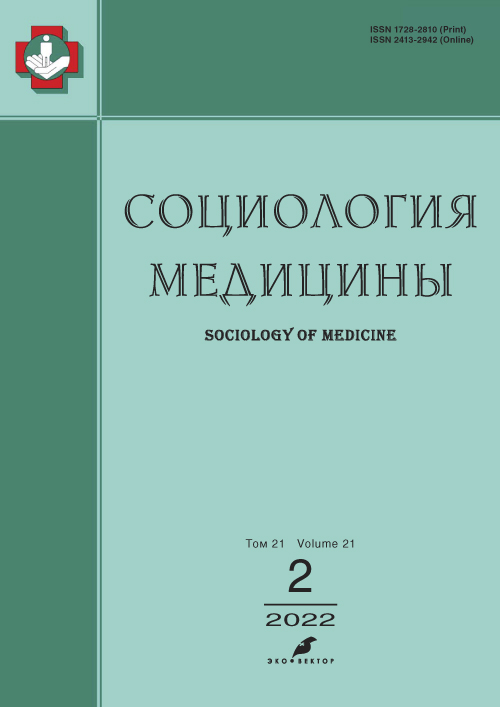Социально-медицинские аспекты проблемы развития инклюзии в современном российском обществе: одномоментное исследование
- Авторы: Гевандова М.Г.1, Маяцкая Н.К.1, Горбунова В.В.1
-
Учреждения:
- Ставропольский государственный медицинский университет
- Выпуск: Том 21, № 2 (2022)
- Страницы: 171-176
- Раздел: СОЦИОЛОГИЯ ЗДОРОВЬЯ И БОЛЕЗНИ
- URL: https://rjsocmed.com/1728-2810/article/view/115066
- DOI: https://doi.org/10.17816/socm115066
- ID: 115066
Цитировать
Аннотация
Обоснование. Актуальность вопроса исследования социально-медицинских аспектов проблемы развития инклюзии в современном российском обществе обусловлена, с одной стороны, увеличением числа лиц с инвалидностью, необходимостью повышения её уровня и качества, а, с другой, недостаточным уровнем готовности системы здравоохранения и социальной защиты населения к оказанию эффективной комплексной помощи лицам с инвалидностью и ограниченными возможностями здоровья.
Цель. Определить основные проблемы и трудности молодых инвалидов при получении необходимой медицинской и социальной помощи.
Материалы и методы. В статье представлены результаты анкетирования молодых людей с инвалидностью, проживающих в Ставропольском крае. В исследовании, проведённом на базе ФГБОУ ВО «Ставропольский государственный медицинский университет» в сентябре – октябре 2022 года, приняли участие 195 человек в возрасте от 18 до 30 лет (средний возраст 21,9 года). Основным методом исследования выступил анкетный опрос, составленный с помощью Google-формы.
Результаты. Ведущими условиями обеспечения инклюзии для лиц с инвалидностью и ограниченными возможностями здоровья служат обеспечение доступности услуг в области здравоохранения и образования, уровень социальной поддержки и помощи, возможность активного участия в культурной и общественной жизни современного общества, занятия адаптированной физической культурой и спортом. Результаты проведённого исследования свидетельствует о недостаточном уровне развития социально-медицинского реабилитационного потенциала лиц с инвалидностью и наличии социально-медицинских барьеров, препятствующих активному включению инвалидов в жизнь современного общества. Лица с инвалидностью и члены их семей сталкиваются со следующими проблемами: недостаточный уровень развития доступной архитектурной среды, низкий уровень материально-технической обеспеченности услуг и инноваций в области социальной реабилитации, неготовность специалистов к инклюзивному взаимодействию, отсутствие объективной и доступной информации о современных методах лечения и реабилитации, системы социально-психологической помощи и сопровождения после наступления совершеннолетия.
Заключение. Ведущими направлениями повышения эффективности социальной политики в области развития инклюзивного взаимодействия являются создание ресурсных центров по комплексному сопровождению лиц с инвалидностью и членов их семей, совершенствование организационно-правовых механизмов поддержки общественных организаций инвалидов и членов их семей, мероприятий по инклюзивному волонтёрству, ориентированных на активное включение лиц с инвалидностью в жизнь современного общества, повышение профессиональной компетентности специалистов системы здравоохранения и социальной защиты в области обеспечения инклюзивного взаимодействия с лицами с инвалидностью.
Полный текст
Об авторах
Маргарита Грантиковна Гевандова
Ставропольский государственный медицинский университет
Автор, ответственный за переписку.
Email: mgev@yandex.ru
ORCID iD: 0000-0002-5811-9624
SPIN-код: 5310-9483
д.м.н.
Россия, СтавропольНаталья Константиновна Маяцкая
Ставропольский государственный медицинский университет
Email: mayatskaya_nata@mail.ru
ORCID iD: 0000-0001-6680-0340
SPIN-код: 1222-7155
к.пед.н.
Россия, СтавропольВалентина Васильевна Горбунова
Ставропольский государственный медицинский университет
Email: vellsav@mail.ru
ORCID iD: 0000-0002-2793-8766
SPIN-код: 6401-9068
к.пед.н., доцент кафедры
Россия, СтавропольСписок литературы
- Кантор В.З., Матасов Ю.Т., Пенин Г.Н., Антропов А.П. Инклюзия разумная: интеграция и дифференциация // Universum: Вестник Герценовского университета. 2012. № 1. С. 44–49.
- Шмидт В.Р. Междисциплинарный подход к проблеме социальной эксклюзии // Журнал исследований социальной политики. 2004. Т. 2, № 4. С. 547–566.
- Киселева Т.Г., Кузнецова Н.А. Инклюзия: вызов современного образования // Мат-лы III Всероссийской (с международным участием) научно-практической конференции «Философские, социологические и психолого-педагогические проблемы современного образования»; Ноябрь 19–20, 2022; Барнаул. Режим доступа: http://case.asu.ru/files/form_312-42352.pdf. Дата обращения: 19.01.2023.
- Козловская Г.Ю., Борозинец Н.М. Инклюзивная политика и инклюзивная практика в вузе: уч. пос. Ставрополь: СКФУ, 2020.
- Богданова Т.Г., Гусейнова А.А., Назарова Н.М., и др. Педагогика инклюзивного образования: учебник / под ред. Н.М. Назаровой. Москва: ИНФРА-М, 2018.
- Ткаченко В.С. Медико-социальные основы независимой жизни инвалидов: уч. пос. Москва: Дашков и Ко, 2010.
Дополнительные файлы







